unit 14 学案joy
人教版九年级上册英语第十四单元学案设计(公开课)
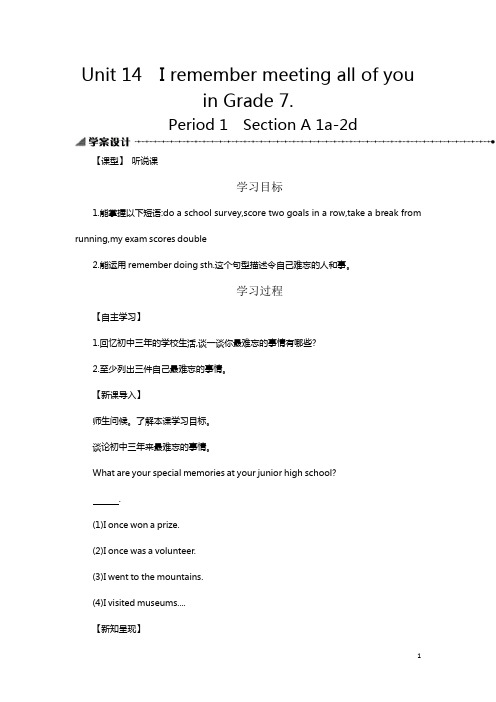
Unit 14I remember meeting all of you inGrade 7.Period 1Section A 1a-2d【课型】听说课学习目标1.能掌握以下短语:do a school survey,score two goals in a row,take a break from running,my exam scores double2.能运用remember doing sth.这个句型描述令自己难忘的人和事。
学习过程【自主学习】1.回忆初中三年的学校生活,谈一谈你最难忘的事情有哪些?2.至少列出三件自己最难忘的事情。
【新课导入】师生问候。
了解本课学习目标。
谈论初中三年来最难忘的事情。
What are your special memories at your junior high school?.(1)I once won a prize.(2)I once was a volunteer.(3)I went to the mountains.(4)I visited museums....【新知呈现】看图片,听老师的示范,进入学习环节。
What do you remember doing at junior high school?Do you remember Mr.Wang?...【拓展提升】小组调查:询问其他成员最难忘的事,并向大家汇报。
句型:What do you remember doing at junior high school?【跟踪训练】1.Work on1a.Ask students to check the things they remember doing at junior high school.Add more to the list.2.Practice in pairs using the information in1a.3.汉译英(1)初中(2)结束(3)获奖(4)做志愿者(5)教学方法(6)记得做过某事(7)对……有耐心(8)无论(9)因为(10)得满分【课堂练习】根据2d对话,补全短文Clara said she would Ms.Lee and Mr.Brown the most junior high school,because Ms.Lee helped Clara to the answers herself how difficult they were and Mr.Brown always the time to things to her clearly she couldn’t anything.Judy said she would miss Ms.Griffin the most because she her in English class. her,she put in and her exam scores.课堂小结先自主学习,再以四人小组方式展开讨论:1.本课学习了哪些内容?2.还有什么疑问?组内讨论,解决不了的反馈给老师一起解决。
Unit_14教案
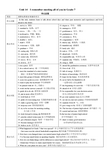
Unit 14 I remember meeting all of you in Grade 7课时分解第一课时Section A(1a ~ 2d)§自主学习方案【自学自查】根据汉语提示完成单词。
1. The students are doing a school survey(调查)about their eating hobbits.2. The workers are making the products carefully to meet the standard(标准)of the international.3. He father was so angry that he broke the keyboard(键盘)of his computer.4. This page has the clear instruction(说明)of this kind of medicine.5. The man did the same job as us but was paid double(双倍的).§课堂导学方案Step 1 情景导入(参考案例)用多媒体给学生播放一些七至九年学生们学校活动的录像或照片,然后询问同学们还记得哪些学校活动。
Teacher:Your junior high school days are over. Do you have any special memories?Students: : I remember____.①winning a prize②take part in the school trip③get into a fight with my friends……环节说明:通过视频和课前的一个师生问答互动引入新课的话题Step 2 完成教材1a-1c的任务【操作案例】1. 要求学生翻开课本P105,迅速阅读1a部分的内容。
你记忆中在中学做过的事勾选出来,并添加更多的活动。
最新人教版九年级下册Unit14教案精品
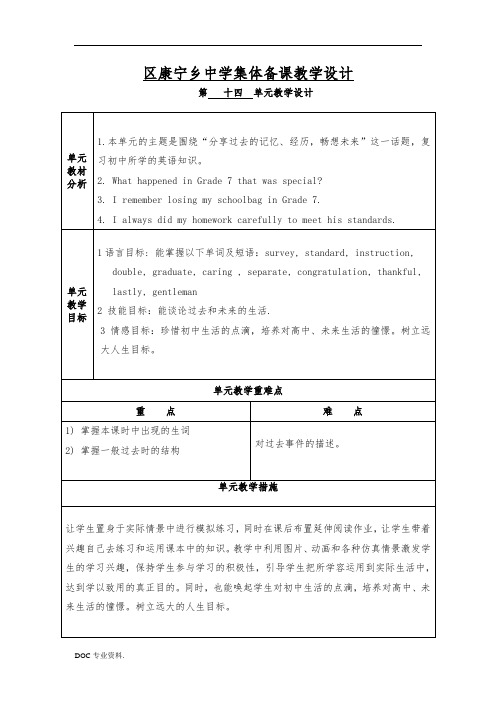
方法
Listening and speaking methods. Pair works.
情感
态度
价值
观
After learning this part, every student will be have a sweet memory of his/her own past three years and will remember these unforgettable memories.
Step5 Summary and Homework
1. Recite the conversation in 2d.
2. Finishtheexercises in the workbook.
Learn the new word: standard
2. Listen again and answer the questions.
1) What did Mary lose in Grade 7?
2) Who helped her find it?
3) What did Peter do to meet Mr. Brown’s standards?
At junior high school,
I remember: 1._____winning a prize 2._____being a volunteer
3._____doing a school survey
4._____a friend helping me with a problem
I remember losing my schoolbag in Grade 7.
I always did my homework carefully to meet his standards.
九年级英语unit14知识点及教案

九年级英语unit14知识点及教案九年级英语Unit 14知识点及教案一、课前准备1. 教师准备PPT,包括各种图片和示例句子。
2. 确保教室设备运转正常,供电充足。
二、教学目标1. 学习并掌握Unit 14中的重点词汇和短语。
2. 学会运用所学知识表达自己的意见和看法。
3. 提高学生的听说能力和交际能力。
三、教学步骤Step 1: 导入新课1. 准备一张世界地图,展示给学生,引出本节课的主题——旅行。
2. 让学生观察地图,询问他们曾经去过的地方,并让他们谈谈对于旅行的看法。
Step 2: 学习重点词汇和短语1. 教师通过PPT展示Unit 14中的重点词汇和短语,包括travel, journey, destination, accommodation, sightseeing等。
2. 让学生跟读、背诵和理解这些词汇和短语,并举例子来加深理解。
Step 3: 学习重点句型1. 教师通过PPT展示不同句型,如“I enjoy traveling because…”、“I think traveling is…”以及它们的否定形式。
2. 让学生模仿示例句子,并根据自己的实际情况进行创作。
鼓励学生用不同的连词、形容词或副词来表达自己的感受和看法。
3. 可以进行小组活动,让学生与同桌分享自己的句型,并互相提出问题或提供建议。
Step 4: 听力训练1. 准备一段关于旅行的短文或对话,播放给学生两遍。
2. 让学生听一遍短文或对话后,回答相关的问题。
通过检查答案,帮助学生理解听力材料,提高他们的听力能力。
Step 5: 交流讨论1. 让学生结合自己的实际情况,谈论曾去过的地方,以及对这些地方的感受和看法。
2. 可以采用小组讨论的方式,让学生分享自己的经历,互相交流和倾听。
鼓励学生提出问题和回答问题。
3. 教师引导学生进行交流,并注意纠正他们的语法和用词错误。
Step 6: 形成小结1. 教师总结本节课的重点内容,回顾学习的知识点和句型。
人教版英语九年级全册Unit14写作课教学设计
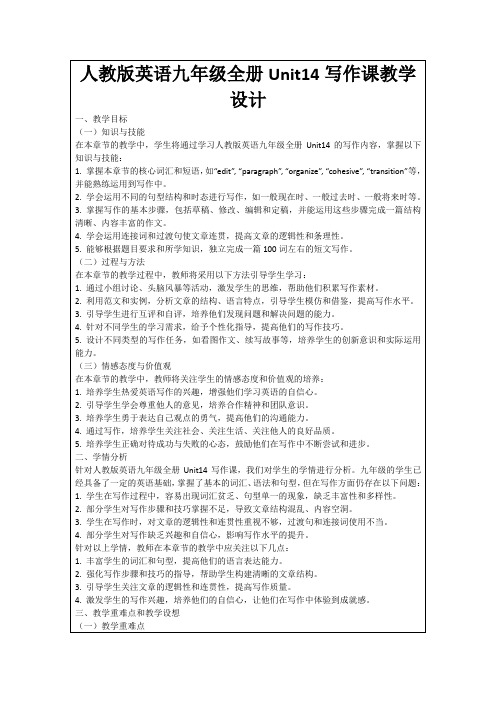
为了巩固本节课的学习内容,提升学生的写作能力,特布置以下作业:
1.完成一篇关于描述你最喜欢的地点的作文,要求不少于100词。在作文中,尽量运用本节课所学的核心词汇和短语,以及不同句型和时态。
2.针对自己的作文,进行自评和互评。同学之间可以相互交换作文,互相指出优点和需要改进的地方,以此提高写作水平。
6.结合Unit14的学习内容,思考以下问题:如何运用写作技巧和策略,使自己的作文更具吸引力?在下节课上,与同学分享你的心得和体会。
7.主动参与课后英语角活动,与同学们一起讨论和分享写作心得,提高自己的写作兴趣和自信心。
作业布置注意事项:
1.作业量适中,确保学生能在规定时间内完成,避免造成过重的学习负担。
2.鼓励学生积极参与自评和互评,培养他们发现问题和解决问题的能力。
3.家长参与作业,既能监督学生的学习进度,又能增进亲子关系,提高学生的学习兴趣。
4.作业布置要具有针对性,确保学生在完成作业的过程中,能够巩固所学知识,提升写作能力。
5.教师应及时批改作业,给予反馈和建议,帮助学生不断进步。
5.设计不同类型的写作任务,如看图作文、续写故事等,培养学生的创新意识和实际运用能力。
(三)情感态度与价值观
在本章节的教学中,教师将关注学生的情感态度和价值观的培养:
1.培养学生热爱英语写作的兴趣,增强他们学习英语的自信心。
2.引导学生学会尊重他人的意见,培养合作精神和团队意识。
3.培养学生勇于表达自己观点的勇气,提高他们的沟通能力。
人教版英语九年级全册Unit14写作课教学设计
一、教学目标
(一)知识与技能
在本章节的教学中,学生将通过学习人教版英语九年级全册Unit14的写作内容,掌握以下知识与技能:
英语人教版九年级全册Unit14(第一课时)教案

Unit 14 I remember meeting all of you in Grade 7Section A 第一课时1. 教学目标复习宾语从句、一般将来时、现在进行时、一般过去时、现在完成时会用所学句型分享过去回忆和经历2. 教学重点/难点分享过去回忆和经历过程中各种时态的选取和运用。
3. 教学用具4. 标签5. 教学过程Step 1Lead inT: Time goes by! You have studied at our school for three years. Looking back at the past three years, I think you should have many special memories. Would you like to share them with us?S1: I remember…S2: I remember…[设计意图:创造真实的语言环境,师生互动交流,围绕“school days”谈论初中三年的记忆和经历,导入新课。
]Step 2Practice (1a)Get the students to check (√) the things they remember doing at junior high school in 1a. And then ask them to add more to the list. And check their work with several students.[设计意图:在情境中呈现和操练生词和短语,在具体的活动中进行巩固和练习,提高学生的学习兴趣和学习效率。
][设计意图:围绕校园生活,展开听力训练,培养听取大意和关键、有效细节信息的能力,通过听力训练进行语言输入,为接下来的语言输出训练奠定基础。
]Step 4Post listening activities1.Have the students listen to the tape of 1b and repeat.2.Get the students to list some memories and experiences from junior high school according to the information in 1c. Share their lists with their partner.3.Ask some pairs to present their conversations to the whole class.[设计意图:用口语回忆初中生活记忆和经历,锻炼学生英语交际能力。
Unit14作文学案-人教版九年级英语全册
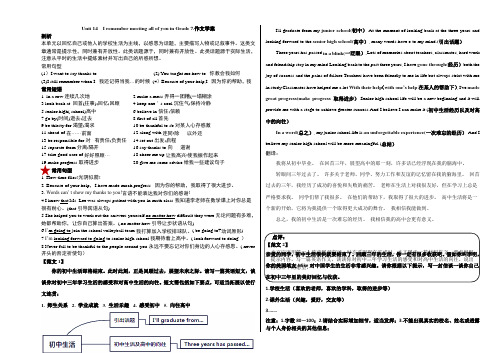
本文应该用第一人称来展开叙述,时态采用现在完成时。
本文属于一篇材料作文。
要求根据提示内容,写一篇英语作文,谈谈你对初中三年学习生活的感受和对高中生活的向往,说出自己心中的愿望。
Unit 14 I remember meeting all of you in Grade 7.作文学案剖析本单元以回忆自己或他人的学校生活为主线,以感恩为话题,主要描写人物或记叙事件。
这类文章通常是提示性,同时兼有开放性。
此类话题源于,同时兼有开放性。
此类话题源于实际生活,注意从平时的生活中提炼素材并写出自己的所感所想。
常用句型(1)I want to say thanks to... (2) You taught me how to...你教会我如何...(3)I still remember when I...我还记得当我…的时候 (4)Because of your help,I...因为你的帮助,我... 常用短语1. in a row 连续几次地2.make a mess 弄得一团糟(一塌糊涂3.look back at 回首(往事);回忆;回顾4.keep one 's cool 沉住气;保持冷静5.senior high( school)高中6.believe in 信任;信赖7.go by(时间)逝去;过去8.first of all 首先9.be thirsty for 渴望;渴求 10.be thankful to sb.对某人心存感激 11.ahead of 在……前面 12.along with 连同;除......以外还 13.be responsible for 对...有责任;负责任 14.set out 出发;启程15.separate from 分离:隔开 16.say thanks to 向......道谢17.take good care of 好好照顾… 18.cheer me up 让我高兴;使我振作起来 19.make progress 取得进步20.give me some advice 给我一些建议句子常用句型1. How time flies!光阴似箭!2. Because of your help ,I have made much progress. 因为你的帮助,我取得了很大进步。
Unit14单元教学反馈教学设计2024-2025学年人教版英语九年级
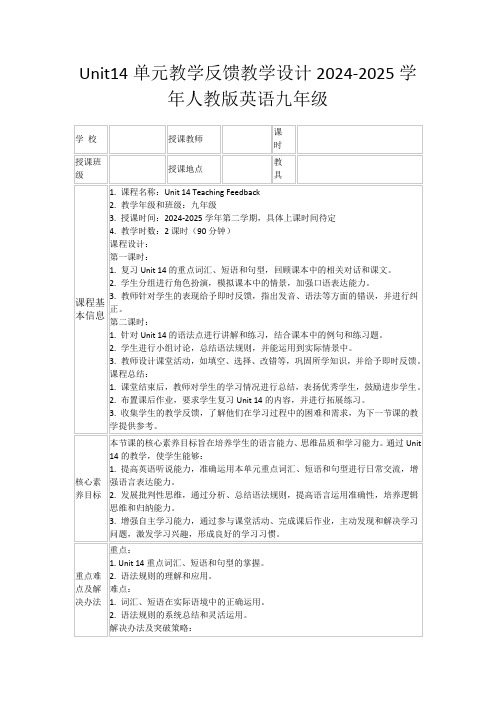
在情感升华环节,我觉得可以更加深入地引导学生思考英语与生活的联系,培养他们的社会责任感。例如,可以让学生结合Unit 14的主题,探讨如何在日常生活中用英语传播正能量,提高他们的跨文化交际能力。
-教师和其他学生共同评价口语表达的正确性和流利度。
3.词汇填空:
-设计一些填空题,让学生在规定时间内完成,检测他们对词汇的掌握情况。
-题目可以涉及课文原文,也可以创设新的语境。
4.语法改错:
-提供一些包含语法错误的句子,让学生找出错误并进行改正。
-这有助于巩固学生对语法规则的理解和运用。
5.小组竞赛:
-英语学习软件或应用,提供语音识别、语法纠正等功能的工具,辅助学生课后自学。
-英文报纸、杂志,特别是青少年版或教育专版,可以提供丰富的阅读材料和时事话题,提高学生的阅读兴趣和语言应用能力。
2.拓展建议:
-鼓励学生利用课外时间阅读英文绘本或故事书,挑选与Unit 14主题相关的内容,提升阅读理解能力,并尝试用所学词汇和语法复述故事情节。
课堂小结,当堂检测
在本节课中,我们共同学习了Unit 14的内容,重点掌握了日常生活中的英语词汇、短语和语法。通过课堂讲解、互动讨论、角色扮演等多种形式,学生们对新知识有了初步的了解和运用。接下来,我们将进行课堂小结和当堂检测,以检验学生们在本节课的学习成果。
一、课堂小结
1.重点词汇回顾:
-复习本节课学习的重点词汇,如“shopping”、“cooking”、“cleaning”等,并要求学生能够正确拼写和运用。
人教新目标九年级英语全册Unit 14(第1课时)学案

精品基础教育教学资料,请参考使用,祝你取得好成绩!Unit 14 I remember meeting all of you in Grade 7【学习目标】(一) 知识与技能1. To learn how to describe unforgettable people and things2. To understand the pasage on Page 107.3. To learn the following expressions: in a row, shall, overcome 等(二) 过程和方法4. To know how to talk about the past by practising and role-play.5. To look back on your last three years.(三) 情感态度和价值观6. After learning this part, every student will be have a sweet memory of his/herown past three years and will remember these unforgettable memories.【自主梳理】1. Turn to Page 105 and finish task 1a.2. Read the poem on Page 107 and finish the task 3a and 3b.3. Check answers.【重点领悟】Studying useful words and expressions.1. in a row 成一行;连续;If I'm inside for ________________, I go crazy.如果连续3天不出来,我会发疯的。
How do you account for losing five games in a row?你如何解释一连输了五场比赛呢 ?Ten footballer _________________on the sport ground.运动场上一字儿站着十名足球运动员.2. shall(1) Shall作为助动词,一般用于第一人称Ⅰ和We,表示一个将来的动作,构成将来时态。
九年级英语下册unit 14英文教案
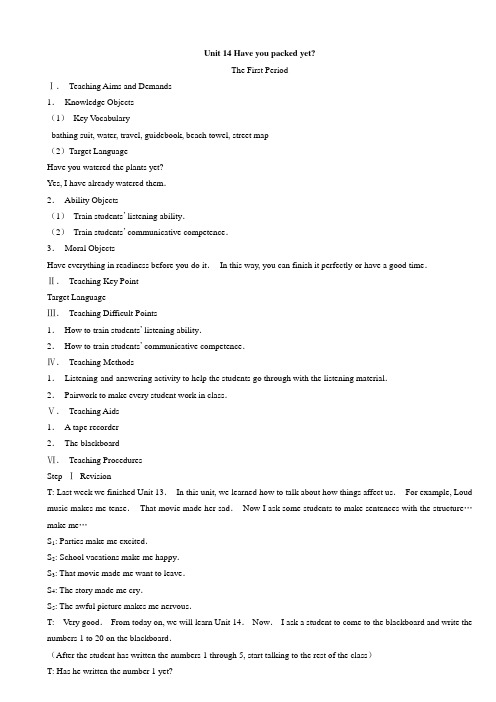
Unit 14 Have you packed yet?The First PeriodⅠ.Teaching Aims and Demands1.Knowledge Objects(1)Key Vocabularybathing suit, water, travel, guidebook, beach towel, street map(2)Target LanguageHave you watered the plants yet?Yes, I have already watered them.2.Ability Objects(1)Train students’ listening ability.(2)Train students’ communicative competence.3.Moral ObjectsHave everything in readiness before you do it.In this way, you can finish it perfectly or have a good time.Ⅱ.Teaching Key PointTarget LanguageⅢ.Teaching Difficult Points1.How to train students’ listening ability.2.How to train students’ communicative competence.Ⅳ.Teaching Methods1.Listening-and-answering activity to help the students go through with the listening material.2.Pairwork to make every student work in class.Ⅴ.Teaching Aids1.A tape recorder2.The blackboardⅥ.Teaching ProceduresStep ⅠRevisionT: Last week we finished Unit 13.In this unit, we learned how to talk about how things affect us.For example, Loud music makes me tense.That movie made her sad.Now I ask some students to make sentences with the structure…make me…S1: Parties make me excited.S2: School vacations make me happy.S3: That movie made me want to leave.S4: The story made me cry.S5: The awful picture makes me nervous.T: Very good.From today on, we will learn Unit 14.Now.I ask a student to come to the blackboard and write the numbers 1 to 20 on the blackboard.(After the student has written the numbers 1 through 5, start talking to the rest of the class)T: Has he written the number 1 yet?Class repeat the question.Has he written the number 1 yet?S s: Has he written the number 1 yet?T: (Pointing to the number 1 on the board)Yes, he has already written the number 1.Class repeat.Yes, he has already written the number 1.S s: Yes, he has already written the number 1.T: (Writing the word already on the blackboard)This is the word already.Class repeat.Already.Look at the blackboard.(pointing to the blackboard)Has he written the number 50 yet? Class repeat the question.Has he written the number 50 yet?S s: Has he written the number 50 yet?T: (Pointing to the highest number already on the blackboard)No, he hasn’t written the number 50 yet.Class repeat.No, he hasn’t written the number 50 yet.S s: No, he hasn’t written the number 50 yet.T: (Writing the word yet on the blackboard)Tish is the word yet.Class repeat.Yet.Now, look at the two words already and yet.Which one is used to talk about things that have happened in the past?SSs: Already.T: Yeah.V ery good.So the other word yet is used to talk about things that will happen in the future.Yeah?SS: Yes.Step Ⅱ1aThis activity introduces key vocabulary and helps students review vocabulary they already know.Read the instructions aloud to the class.Say, Who can give an example of a beach vacation and sightseeing in a city? Ask a student to give the example.(bathing suit, travel guidebook)Get students to add some things to the lists under the two headings.A beach vacation and Sightseeing in a city.Have students do the work individually first.While they are working, walk around the classroom checking the progress of the students.Let students tell the class the words they wrote.Write the words on the blackboard.Read them and let students repeat.Then ask other students to add other words to the lists.Sample answersStep Ⅲ1bThis activity gives students practice in understanding the target language in spoken conversation.Look at the picture.Ask, What can you see in the picture? (There is a family in the picture.They are getting ready for a beach vacation)Point to the box.Invite a pair of students to read the conversation to the class.A: Have you packed the beach towels yet?B: No, I haven’t.Look at the six chores on the list.Let students read each item, then ask different students to explain the meaning of each item in their own words.Make sure students understand the meaning of each item.Go through the instructions with the class.Point to the blank lines in front of each item in the list.Say, You will hear a family talking as they get ready to go on vacation.Listen carefully.Make sure what the family talks about and put a checkmark in front of each chore that is already done.Play the tape.The first time students only listen.Play the tape a second time.Now listen to the tape again.This time please put your checkmarks on the correct blanks.Check the answers with the whole class.AnswersTapescriptWoman: Have you packed the beach towels yet?Boy: No, I haven’t.Can’t Judy pack them?Woman: No, she’s busy.Could you please water the plants?Boy:I’ve already watered them.Woman: Oh, thanks.Man: What about the travel guidebook and the street map?Woman: I’ve already bought the travel guidebook, but I haven’t got the street map yet.Man: That’s OK.I’ll get it.Have you packed the camera?Boy: Yes.I’ve already put it in my suitcase.Woman: Well, I guess that’s everything.Boy: Almost everything.We haven’t locked the windows yet.Step Ⅳ1cThis activity provides guided oral practice using the target language.Go through the instructions with the whole class.Look at the example in the box.Invite a pair of students to read it to the class.S A: Have you watered the plants yet?S B: Yes, I have already watered them.Tell students they will be making conversations with a partner.Look back at the chores in Activity lb.Say, Now look back at the chores in Activity lb.Make conversations talking about what the family members have already done and what they haven’t done yet, using words from the chores, such as packed the camera, locked the windows, bought a street map.While students are working in pairs, walk around the classroom and listen to some pairs.If necessary, offer language support.Then get several pairs of students to say their conversations to the class.Conversation 1S A: Have they packed the camera yet?S B: Yes, they have already packed the camera.Conversation 2S A: Have they bought a street map yet?S B: No, they haven’t bought a street map yet.Notes1.pack—(here)get ready for a journey by doing this2.guidebook—book for travellers, tourists, etc, with information about a place3.Have you watered the plants yet?Yes, I have already watered them: PresentPerfect Tense.The structure is have+ p.p.Pay attention to the two words already and yet.Already is used in affirmative sentences; while yet is used in negative and interrogative sentences.Step ⅤSummaryIn this class, we’ve learned some important words, such as water, travel, guidebook, beach towel.We’ve also learned the target language.Have you watered the plants yet? Yes, I have already watered them.Step ⅥHomeworkMake conversations in pairs to review the target language.Step ⅦBlackboard DesignUnit 14 Have you packed yet?The Second PeriodⅠ.Teaching Aims and Demands1.Knowledge Objects(1)Key Vocabularyrefrigerator, garage, suitcase, clean out, put in, turn off(2)Target LanguageHave you watered the plants yet?No, I haven’t.Have you packed the camera yet?Yes.I’ve already put it in my suitcase.Have you fed the cat?No.I haven’t fed her yet.2.Ability Object(1)Train students’ listening ability.(2)Train students’ speaking ability.3.Moral ObjectWe must be ready with our work before we do it.Ⅱ.Teaching Key Points1.Key Vocabularyclean out, put in, turn off2.Target LanguageHave you watered the plants yet?No, I haven’t.Have you packed the camera yet?Yes.I’ve already put it in my suitcase.Have you fed the cat?No.I haven’t fed her yet.3.StructuresHave you packed the camera yet?Yes.I’ve already put it in my suitcase.Have you fed the cat?No.I haven’t fed her yet.Ⅲ.Teaching Difficult Points1.the target language2.How to train students’ listening ability.Ⅳ.Teaching Methods1.Listening method to improve the students’ listening ability.2.Pairwork to make every student work in class.Ⅴ.Teaching Aids1.A tape recorder2.The blackboardⅥ.Teaching ProceduresStep I RevisionCheck homework.Get some pairs to read their conversations.Collect their conversations and help students correct any mistakes.Step Ⅱ2aThis activity provides guided listening practice using the target language.Look at the picture.Ask, What can you see in the picture? (A boy and a girl are in the kitchen.They both look a little stressed out)Go through the instructions with the class.You will hear a boy and a girl talking about getting ready to go onvacation.Write M after each thing that Mark says and T after each thing that Tina says.Look at the sample answer.Say, Tina said, No.I haven’t cleaned out the refrigerator yet.Get students to repeat No.I haven’t cleaned out the refrigerator yet.Play the recording for students the first time.This time students only listen to the recording.Play the recording a second time.This time let students write Min front of Mark’s statements, and T in front of Tina’s statements.Check the answers with the class.Answers1.T 2.T 3.M 4.T 5.M 6.TTapescriptBoy: Mom and Dad said they want to leave in ten minutes.Are you ready, Tina?Girl: No.I haven’t cleaned out the refrigerator yet.I have to do that right now.Boy: Tina! You’re unbelievable.What about your bike?Girl: I’ve already put it in the garage.But I haven’t locked the garage yet.That’s your job, Mark.Boy: I know.I’ve already done most of my jobs.I’ve taken out the trash.Girl: Have you fed the cat yet?Boy: Not yet.I’ll do it in a minute.Have you turned off your radio?Girl: Yes, I have.I think we’re almost ready.Step Ⅲ2bThis activity provides guided listening practice using the target language.Go through the instructions with the class.Look at the list of questions with blanks in front of each one.Then look back at the statements in Activity 2a.Say, Some of the statements in Activity 2a are answers to questions in Activity 2b.Write the number of the correct answer from Activity 2a in front of each question in Activity 2b.Get several students to read the questions in Activity 2b to the class.Look at the sample answer.Ask a student to read the question and answer to the class.Are you ready, Tina?No, I haven’t cleaned out the refrigerator yet.Play the recording for students.Let students write their answers in the blanks.Play the recording again if necessary.Correct the answers.AnswersHave you fed the cat yet? 5What about you bike? 2Are you ready, Tina? 1Have you turned off your radio? 6Step Ⅳ2cThis activity provides guided oral practice using the target language.Look at the sample conversation in the speech bubbles.Invite a pair of students to read it to the class.S A: Are you ready, Tina?S B: No.I haven’t cleaned out the refrigerator yet.Go through the instructions with the class.Say, With your partner make a conversation using information from Activities 2a and 2b.Have students work in pairs.While they are working, walk around the classroom checking the progress of the pairs and offering help as needed.Invite two pairs to say their conversations to the class.Conversation 1S A: Have you fed the cat yet?S B: Not yet.I’ll do it in a minute.Conversation 2S A: Have you turned off your radio?S B: Yes, I have.Step ⅤGrammar FocusLook at the grammar focus box.Get three students to read the questions and answers to the class.Have you watered the plants yet?No, I haven’t.Have you packed the camera yet?Yes.I’ve already put it in my suitcase.Have you fed the cat?No.I haven’t fed her yet.Let students make up other sentences in pairs using have you…yet questions.For example: Have you had lunch yet? Have another student answer truthfully: Yes, I have or Yes, I have already had lunch, or No, I haven’t had lunch yet.Pay attention to the use of already and yet.Say, When we use the words have and already, we are talking about something that happened in the past, but not a long time ago.When we use the words haven’t and yet, we are talking about something that will happen in the future, but not a long time from now.It will happen soon.For example: I’ve already had breakfast, but I haven’t had lunch yet.Draw a simple diagram to help students understand the grammar focus.Get some pairs to say their sentences aloud to the class.A sample sentenceI’ve already had lunch, but I haven’t had supper yet.Culture noteMany Americans are used to taking at least one vacation trip a year.But in China, some of the students may not be in the habit of taking an annual vacation, or even making a trip to another city.For some students, financial limitations and family obligations make such travel impossible.For others, it may be that taking trips is not something that is common in their home culture.Step ⅥSummaryIn this class, we’ve learned key vocabulary clean out, put in, turn off and the targetlanguage Have you watered the plants yet? No, I haven’t.Have you packed the camera yet? Yes, I’ve already put it in my suitcase.Have you fed the cat? No.I haven’t fed her yet.Step ⅦHomeworkGet students to write some sentences according to the target language.Step ⅧBlackboard DesignUnit 14 Have you packed yet?The Third PeriodⅠ.Teaching Aims and Demands1.Knowledge Objects(1)Key Vocabularychop, wood, light, village, well, farm(2)Target LanguageHave you bought a newspaper?Yes, I’ve already bought a newspaper.2.Ability Objects(1)Train students’ integrating skills.(2)Train the ability of expressing students’ own opinions.3.Moral ObjectsWe should make a plan for our everyday activities and make a schedule.It can remind us how to spend the time.It is good for our study and life.Ⅱ.Teaching Key PointTrain students’ integrating skills.Ⅲ.Teaching Difficult PointHow to improve students’ integrating skills.Ⅳ.Teaching Methods1.Fast-reading method2.Groupwork and pairworkⅤ.Teaching Aids1.A projector2.The blackboardⅥ.Teaching ProceduresStep I RevisionT: Yesterday we learned the target language.The structure is Have you…yet? Yes.I’ve already…Have you…? No.I haven’t…yet.Now who can make sentences using the structure?S1: Have you turned off your radio yet?S2: Yes.I’ve already turned it off.S1: Have you finished your homework?S2: No.I haven’t finished it yet.T: Very good.Step Ⅱ3aThis activity provides reading practice using the target language.Show the key vocabulary words on the screen by a projector.Read the words and ask students to repeat again and again until they can pronounce the words fluently and accurately.Before reading the e-mail message, ask the students what chores do you usually do? Please tell me.(do my homework, clean my room, water the plants, clean our classroom etc.)Go through the instructions with the class.Look at the e-mail message.Let a student read the e-mail aloud to the class.Correct any pronunciation errors to make sure the student is providing a good model for the rest of the class.Get students to read the e-mail message individually, and underline the different chores on their own,Check the answers with the class.Answers1.do my homework2.take the dog for a walk3.water my mom’s plants4.do some shopping5.chop wood6.light the fire7.collect water8.feed the animalsLet students read the e-mail again for further comprehension.While they are reading.Walk around the classroom, offering help if they have any words or phrases they don’t understand.Notes1.chore—small duty or piece of work, especially ordinary everyday task(in the home, on a farm, etc.)In the e-mail message, there are many chores, such as do my homework, take the dog for a walk, water my mom’s plants.2.chat—talk about unimportant things3.kid—(sl)child; young person4.well—(here n.)shaft, usually lined with brick or stone, for obtaining water from an underground source 5.anyway—in any possible way; by any possible meansStep Ⅲ3bThis activity provides reading, writing.listening and speaking practice using the target language.Look at the pictures of the three people and read their names aloud to the class.Then point to the chart.Let students read the information in it.Make sure students understand the information in the chart by asking questions and point out things.T: Look at the three pictures above the chart.Under each person is a list of the things he or she has done or will do today.Now look at the chart.What do you see in the first column?S1: Numbers.Clock times.T: That’s right.Those are clock times.Those times show what the three people were doing at 9:00,at 10:00,and so forth.It is 12:00 noon now.so the 1:00 and 2:00 times show things they will do later today.What has Steve already done?S2: He’s already done his homework.He’s already bought a newspaper.He’s already fed the dog.T: That’s correct.What things hasn’t he done yet?S3: He hasn’t watered the plants.He hasn’t cleaned his room.T: OK.Very good.Go through the instructions with the class.Put students in several groups.Say, Each student in a group will decide to be one of the people.The other students in the group will ask questions to find out which person in the chart he or she has decided to be.Make sure students understand how to do the exercise.Look at the example in the box.Invite a pair of students to read it aloud to the class.S A: Have you bought a newspaper?S B: Yes, I’ve already bought a newspaper.Ask students, which of the three people could it be? Can you find out? Yeah.It could be Steve or Elise.Get students to do the work in groups.While they are working, move around the classroom checking the work of each group.Ask two groups to do the work as the examples.Group 1: Have you watered the plants?S1: Yes.I’ve already watered the plants.Group 2: Have you fed the dog?S2: No.I haven’t fed the dog yet.(Person 1: Kathy; Person 2: Elise)Step ⅣPart 4This activity provides reading, writing, listening and speaking practice using the target language.Go through the instructions with the class.Invite a good student to give an example of things that he or she has and hasn’t done this week: I have done my homework.But I haven’t done some shopping.Put students in some groups of three.Let students complete the work in groups.Finish the table.Review the task.Get some groups to share the results of their surveys.Sample answersOptional activityAsk students to write their own schedules, listing the time of day they do each thing.Then get students to work in pairs.Student A thinks of one activity.Student B gets five tries to guess the activity.Then student B thinks of an activity and student A guesses what it is.Step ⅤSummaryIn this class, we’ve learned some key vocabulary words such as chop, wood, light.village, well, farm.We’ve also done a lot of reading, writing and speaking practice using the target language.Step ⅥHomework1.Finish off the exercises on pages 57~58 of the workbook.2.Get students to talk about the things they have done and they haven’t done yet this week in pairs.Step ⅦBlackboard DesignUnit 14 Have you packed yet?The Fourth PeriodⅠ.Teaching Aims and Demands1.Knowledge Objects(1)Key Vocabularymember, original, songs, award(2)Target LanguageHave they been on TV yet?Yes, they’ve been on TV lots of times.2.Ability Object(1)Train students’ speaking and listening ability.(2)Train students’ ability to understand the target language in spoken conversation.(3)Train students’ ability to use the target language.3.Moral ObjectLove music and you can benefit from it.Ⅱ.Teaching Key Points1.Key Vocabularymember, original, songs, award2.Target LanguageHave they been on TV yet?Yes, they’ve been on TV lots of times.Ⅲ.Teaching Difficult Points1.How to train students’ speaking and listening ability.2.How to use the target language.Ⅳ.Teaching Methods1.Listening method2.Groupwork to make every student work in class.Ⅴ.Teaching Aids1.A tape recorder2.The blackboardⅥ.Teaching ProceduresStep I RevisionCheck homework.Ask some pairs to say their conversations to talk about the things they have done and they haven’t done yet this week.S A: Have you done your homework?S B: Yes, I’ve already done my homework.S A: Have you cleaned your room?S B: No, I haven’t cleaned my room yet.Step ⅡPart 1This activity introduces key vocabulary, and helps students review vocabulary they already know.Look at the picture.Ask, What can you see in the picture? (A man is playing the guitar and singing a song)Point to the box.Invite a student to read the four questions.Make sure students understand the questions.Get students to fill in the blanks on their own.A moment later, ask several students to read their answers to the class.Notes1.favorite—(adj.)best liked2.What is your favorite band?—What band do you like best?3.band—group of persons who play music together4.band member—member of a bandStep Ⅲ2aThis activity gives students practice in understanding the target language in spoken conversation.Look at the picture.A record agent is interviewing members of a band.Let students read the instructions.Point to the headings and the blank lines following each heading.You will hear a woman interviewing members of a band.They are talking about the band.Now, listen and write your answers on these blank lines.Play the recording the first time.This time students only listen.Play the recording a second time.This time, ask students to write their answers on the blank lines as they listen to the recording.Play the tape again if necessary.Check the answers with the class.AnswersBand’s name: Apple Ice CreamHow long they’ve been together: About a yearNumber of concerts they’ve done: SixTapescriptWoman: Hmmm.That was…umm…not bad.Now tell me a little about yourselves.What was your name again? Boy 1: Apple Ice Cream.Woman: Apple Ice Cream? That’s uhhh …a nice name.Hong long have you been together?Boy 1: About a year.Woman: One year, huh? And have you written any original songs yet?Boy 2: Yes, we have.We used to play stuff by other bands, but now we only play our own songs.That one you just heard was ours.Woman: Good, great! I’m interested in people who play their own music.Have you ever won an award of any kind? Boy 1: Yes, we have.We won the best new group of the year last month.Woman: Wow.That’s great.Have you made a music video yet?Boy 1: No, not yet.Woman: But you’ve had your own concert?Boy 2: Oh, yeah.We’ve had six concerts of our own.Woman: Have you ever been on TV?Boy 1: No, we haven’t.But we’ve already talked to "Bands on Parade" about doing a TV show next month.Woman: Sounds like you guys are on your way.Step Ⅳ2bThis activity provides listening practice using the target language.Go through the instructions with the class.Look atthe list of things the band may or may not have done.Get different students to read the list.Make sure students understand the task.You will hear the same recording again.This time please listen and check the things the band has already done.Point to the sample answer.On the recording you hear that the band has already written some original songs so you check that answer.If necessary, play the recording again.Then get students to put checkmarks in front of the correct answers.Check the answers.Answers√written original songsmade a music video√won an awardbeen on TV√had concertsNotes1.original—newly formed or created, not copied or imitated2.award—(here)a prize in a competition3.video—televisionStep Ⅴ2cThis activity provides guided oral practice using the target language.Look at the sample conversation in the box.Invite two students to read it to the class.S A: Have they been on TV yet?S B: Yes, they’ve been on TV lots of times.Go through the instructions with the class.Talk about your favorite bands with your partner.Let students work in pairs.As they work, walk around the classroom checking the progress of the pairs and offering help as needed.A moment later, invite two pairs to say their conversations to the class.A1: Have they written any original songs yet?B1: Yes, they’ve written several original songs.A2: Have they had their own concert yet?B2: Yes, they’ve had five concerts of their own.Step ⅥSummaryIn this class, we’ve learned some key vocabulary, such as member, original, songs, award.We’ve also learned the target language.Have they been on TV yet?Yes, they’ve been on TV lots of times by listening and speaking.Step ⅦHomeworkTalk about some bands using the target language, and write down the conversations.Step ⅧBlackboard DesignUnit 14 Have you packed yet?The Fifth PeriodⅠ.Teaching Aims and Demands1.Knowledge Objects(1)Key V ocabularyhit, appear, tour, miss, lead singer, mostly, top ten, good luck, off to a great start(2)Practise reading an article.(3)Practise writing something using the target language.2.Ability Objects(1)Improve students’ integrating skills—reading skill and writing skill.(2)Improve students’ speaking ability by groupwork.3.Moral ObjectIt is good for us to listen to music in the busy life.Music can make us relaxed, and we can work better.Ⅱ.Teaching Key PointPractise reading and writing using the target language.Ⅲ.Teaching Difficult Points1.How to improve students’ reading ability.2.How to improve students’ speaking ability by groupwork.Ⅳ.Teaching Methods1.Reading method to improve students’ reading ability.2.Writing method to improve students’ writing ability.3.Pairwork to make every student work in class.Ⅴ.Teaching Aids1.A projetor2.The blackboardⅥ.Teaching ProceduresStep I RevisionRevise the target language presented in this unit.Check homework.Ask some pairs to read out their conversations.Step Ⅱ3aThis activity provides reading practice using the target language.Teach the new words.Show the new words on the screen by a projector.Read the words and ask students to repeat them again and again until they can pronounce them correctly and fluently.Look at the article Don’t miss the New Ocean Waves! Invite a student to read the article aloud to the class.Correct any pronunciation mistakes to make sure the student is providing a good model for the rest of the class.Look at the picture.Ask students, What’s the article about? Can you guess?(It’s about a band)Go through the instructions with the students.Make sure students know what to do.Read the article carefully.Circle the things the New Ocean Waves have already done.Underline the things they haven’t done yet.Before students do it, give them two examples: One thing the New Ocean Waves have already done is In the last twelve months, they’ve had three major concerts.Ask students to circ1e the words had three major concerts.One thing they haven’t done is They’re going to appear on CCTV next month.Let students underline those words appear on CCTV.Get students to finish the work on their own.Check the answers with the class.AnswersCircled: had three major concerts; made a bit CD; played other people’s songs; played mostly our own songs; had a few songs in the top ten.Underlined; appear on CCTV; go on a world tour; hope to have a number one hitNotes1.hit—successful attempt or performance, for example, hit songs, songs that win wide popularity2: lead—principal part in a play; actor or actress who plays such a part.3.some day—on a day in the future; pay attention to the difference between some day and one day; one day means on a day in the past or in the future4.charity—(kindness in giving)help to the poor; money, food, etc.so givenStep Ⅲ3bThis activity provides reading and writing practice using the target language.Read the instructions aloud to the class.Get a students to read the sentences at the beginning of the paragraph to the class.Tell students that they should look back at Activity 2b and finish writing the paragraph using the information in Activity 2b.Have students finish the paragraph on their own.While they are working, walk around the classroom offering help and answering questions as needed.When they finish, invite a student to read his or her completed paragraph to the class.。
九年级英语unit14学案.docx
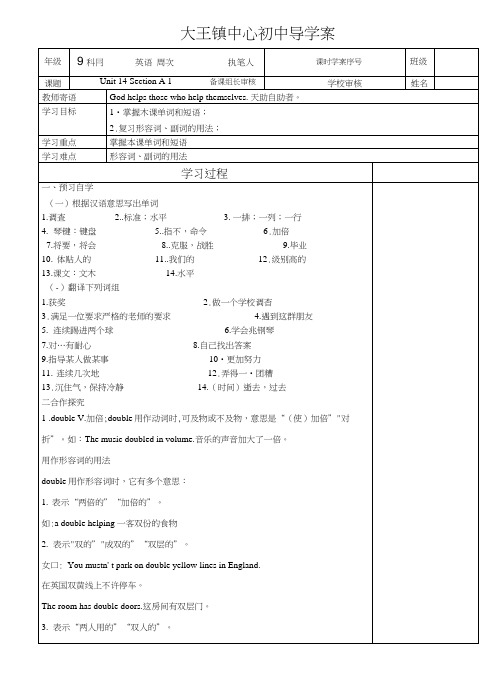
大王镇中心初中导学案年级9 科冃英语周次执笔人课时学案序号班级课题Unit 14 Section A 1 备课组长审核学校审核姓名教师寄语God helps those who help themselves. 天助自助者。
学习目标1•掌握木课单词和短语;2.复习形容词、副词的用法;学习重点掌握本课单词和短语学习难点形容词、副词的用法学习过程一、预习自学(一)根据汉语意思写出单词1.调査2..标准;水平3. 一排;一列;一行4.琴键:键盘5..指不,命令6.加倍7.将要,将会8..克服,战胜9.毕业10.体贴人的11..我们的12.级别高的13.课文:文木14.水平(-)翻译下列词组1.获奖2.做一个学校调杳3.满足一位要求严格的老师的要求4.遇到这群朋友5.连续踢进两个球6.学会兆钢琴7.对…有耐心8.自己找出答案9.指导某人做某事10•更加努力11.连续几次地12.弄得一•团糟13.沉住气,保持冷静14.(时间)逝去,过去二合作探究1 .double V.加倍;double用作动词时,可及物或不及物,意思是“(使)加倍”"对折”。
如:The music doubled in volume.音乐的声音加大了一倍。
用作形容词的用法double用作形容词时,它有多个意思:1.表示“两倍的”“加倍的”。
如:a double helping 一客双份的食物2.表示"双的”"成双的”“双层的”。
女口: You mustn' t park on double yellow lines in England.在英国双黄线上不许停车。
The room has double doors.这房间有双层门。
3.表示“两人用的”“双人的”。
【课堂变式】•The manager promised to give you _______ for working ••overtime ・1i t• A. double pay B. double C. doubly paid D・pay double •;【解析】考查double作形容词的用法。
Unit14学案学生版
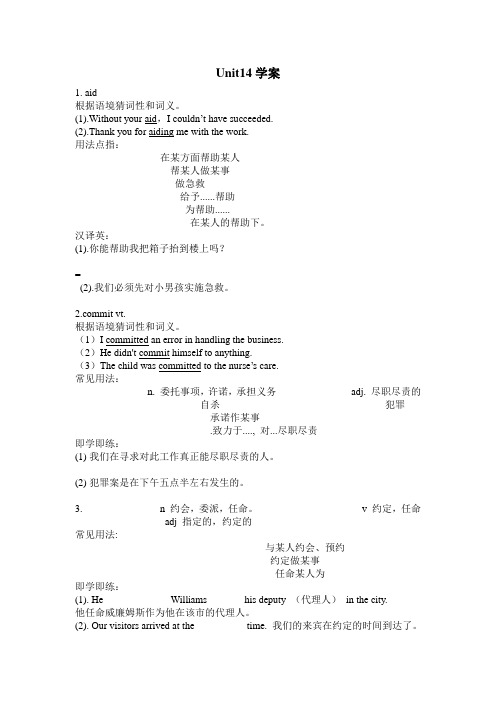
Unit14学案1. aid根据语境猜词性和词义。
(1).Without your aid,I couldn’t have succeeded. _________________(2).Thank you for aiding me with the work. ______________________用法点指:_________________在某方面帮助某人___________________帮某人做某事____________________做急救_____________________给予......帮助______________________为帮助......_______________________在某人的帮助下。
汉译英:(1).你能帮助我把箱子抬到楼上吗?__________________________________________________________=_________________________________________________________(2).我们必须先对小男孩实施急救。
___________________________________________________________mit vt.根据语境猜词性和词义。
(1)I committed an error in handling the business. _______________________ (2)He didn't commit himself to anything. _____________________________ (3)The child was committed to the nurse’s care. _________________________常见用法:______________ n. 委托事项,许诺,承担义务_____________adj. 尽职尽责的________________________ 自杀____________________犯罪___________________________承诺作某事___________________________.致力于...., 对...尽职尽责即学即练:(1)我们在寻求对此工作真正能尽职尽责的人。
学英语 人教版九年级英语(学案)Unit 14 Section A1 学案
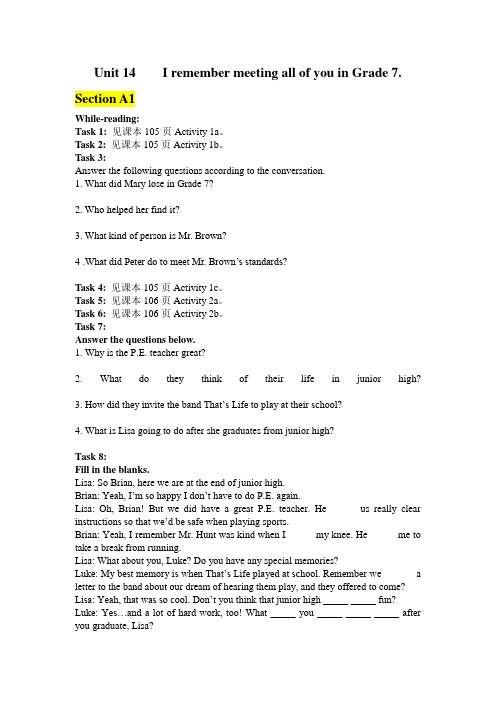
Unit 14 I remember meeting all of you in Grade 7. Section A1While-reading:Task 1: 见课本105页Activity 1a。
Task 2: 见课本105页Activity 1b。
Task 3:Answer the following questions according to the conversation.1. What did Mary lose in Grade 7?________________________________2. Who helped her find it?________________________________3. What kind of person is Mr. Brown?_______________________________4 .What did Peter do to meet Mr. Brown’s standards?________________________________Task 4: 见课本105页Activity 1c。
Task 5: 见课本106页Activity 2a。
Task 6: 见课本106页Activity 2b。
Task 7:Answer the questions below.1. Why is the P.E. teacher great?___________________________________________________________2. What do they think of their life in junior high? ___________________________________3. How did they invite the band That’s Life to play at their school?___________________________________4. What is Lisa going to do after she graduates from junior high?___________________________________Task 8:Fill in the blanks.Lisa: So Brian, here we are at the end of junior high.Brian: Yeah, I’m so happy I don’t have to do P.E. again.Lisa: Oh, Brian! But we did have a great P.E. teacher. He _____ us really clear instructions so that we’d be safe whe n playing sports.Brian: Yeah, I remember Mr. Hunt was kind when I _____ my knee. He _____ me to take a break from running.Lisa: What about you, Luke? Do you have any special memories?Luke: My best memory is when That’s Life played at school. Remember w e ______ a letter to the band about our dream of hearing them play, and they offered to come? Lisa: Yeah, that was so cool. Don’t you think that junior high _____ _____ fun? Luke: Yes…and a lot of hard work, too! What _____ you _____ _____ _____ after you graduate, Lisa?Lisa: I want to go to senior high and then university, so I can study medicine.Task 9:Listen and complete the table.Student Teacher What subject WhyClaraJudyTask 10:Fill in the blanks according to the conversation.Judy and Clara are talking about their junior high school life. Clara says she will miss Ms. Lee and Mr. Brown the most because Ms. Lee _____ always ___________ her in math class. And Mr. Brown always _____ the time __________ things to her clearly ________ he couldn’t understand anything. Judy will miss Ms. Griffin because she encouraged her in English class, and Judy’s exam _______ doubled. They will _____ each of them a card and gift to say thank you.Post-readingQuizⅠ. 根据句意及所给汉语提示填写单词。
人教版英语九年级全册学案设计:Unit14 I remember meeting all of yo

人教版英语九年级全册学案设计:Unit14 I remember meeting all of you in Grade 7(复习)1 / 2九年级英语unit14复习学案1. 获奖2. 做一个学校调查3.满足一位要求严格的老师的要求4. 遇到这群朋友5.连续踢进两个球6. 学会弹钢琴7. 对…有耐心 8自己找出答案9. 指导某人做某事 10. 更加努力 11. 回首 12. 克服恐惧感的自豪 13. 弄得一团糟 14. 保持我的清高 15.尽力赶上早读 16. 期望做某事17.加入学校游泳队 18. 在某方面遇到困难 19.光阴似箭! 20. 取得一个商业学位 21.成为经理 22. 信任某人 23.出席毕业庆典 24. 与…分别 25. 充满活力 26. 渴求知识27. 对未来的希望 28. 一定要向某人表达感激 29. 给某人飞翔的翅膀 30.开始你的新旅程 31.对自己的决定和行为负责 32.走自己的路 33.高中最后一天 34. 恐惧和紧张35 .在中学的最后一天 36.分享如些多美好的记忆 句子1..中学生活结束了,你有什么特别的记忆吗?2.我记得在一次足球比赛中连续踢进两个球。
3.中学毕业后,你会最怀念哪些老师?4.她帮助你自己算出答案,无论它们有多难。
5.无论何时只要是我没听懂的,他总是花时间给我解释清楚。
6. 正是由于她,我才更加努力,我的成绩也成倍提高了。
7.回想起过去的三年,我想起了许多事。
8. 现在毕业的时间到了,我们将要离开我们可爱的学校。
9.我会怀念学校的树木花草以及我们善良,体贴的老师。
10. 我会怀念学校的树木花草以及我们善良,体贴的老师。
11. 我的中学时光一直很快乐。
12.我在发音和课文诵读方面遇到困难。
13.我几乎不能相信时间过得这么快14.我希望取得一个商业学位并成为一名经理。
15.为了庆祝初中生活的结束,他们正准备举行一个晚会。
16. 他们邀请陈老师出席,她很高兴地接受了邀请。
- 1、下载文档前请自行甄别文档内容的完整性,平台不提供额外的编辑、内容补充、找答案等附加服务。
- 2、"仅部分预览"的文档,不可在线预览部分如存在完整性等问题,可反馈申请退款(可完整预览的文档不适用该条件!)。
- 3、如文档侵犯您的权益,请联系客服反馈,我们会尽快为您处理(人工客服工作时间:9:00-18:30)。
高三一轮复习学案高二下册Unit 14 Freedom fighters(主备人:李陵阳)I.重点单词1(1) freedom [ˈfri:dəm] n. 自由These men died for freedom.fight for freedom 为自由而战long for freedom渴望自由with freedom自由地,随便地freedom from,免除,解脱freedom from taxation免税freedom from hunger免于饥饿(2)free [fri:] adj. free from 不受…影响的free of 摆脱了…的,无…的for free = free of charge 免费be free to do sth=do sth freely自由、随意做…… ; 有空做…in one’s free time=in one’s spare time在某人的空闲时间Everyone is free to express himself at the meeting. 会上大家可以畅所欲言set… free 释放,给…自由The old lady is never free from pain. 这个老妇人一直在受苦。
The house was free of mice in the end. 那座房子终于没有老鼠了。
(3.) free vt. 释放, 解除, 使摆脱( 常和介词from或of连用)eg. free him from the debts 免除他的债务2.civil [ˈsivl] (1)公民的civil liberty/rights 公民自由/权利civil duties/responsibilities 公民职责/责任(2)国内的civil war 内战civil affairs 内务(3)文职的civil servant文职人员,公务员3.murder [ˈmə:də] n. 谋杀,谋杀案There are six murders in a week. 一周内发生了六起谋杀案v. 谋杀, (因为无技巧或知识糟蹋了)某事物She'll murder you when she finds out what you've done. 等她发现你干了什么事的时候,她会把你给杀了。
murder a piece of music murder the English languagemurderer 杀人犯murderess女杀人犯4.youth [ju:θ] n. 1)青春期During his youth, he lived in China.他青年时期住在中国。
2) a young person (c)After the match, several youths were arrested. 游行过后,几个年轻人被捕了。
3) young people considered as a group 集合名词The youth of our city is / are always polite. (总的来说是有礼貌的)5. prison [ˈpri:zn] 1)(c)监狱,拘留所This is a model prison.(模范监狱)2)(u)监禁,禁锢He was in prison for ten years.他坐牢十年了。
3) 有关短语:break prison /jail 越狱,从狱中逃走escape from prison 逃出监狱cast/put / throw sb into prison 把…投进监牢take sb to prisonbe set out of prison 被放出监狱go to prison 入狱leave prison 出狱be in prison 在狱中be out of prison 出狱注意:无冠词表抽象意义,加冠词the 指具体的地方,类似的词还有school, bed, sea , hospital, church等。
He is old enough to go to school./ He went to the school to see his father.4) n. 犯人prisoner keep sb as prisoner=take sb prisoner 把…当成犯人In the year 751, the Chinese traveler Du Huan was taken prisoner by the Arabic army.5. revolution [,revəˈlu:ʃn] n. 革命the industrial revolution 工业革命revolutionary adj. 革命的6. slavery [ˈsleivəri] n. 奴隶制度slave 奴隶7. runaway [ˈrʌnəwei] adj. 逃跑的;失控的n. 逃跑;逃跑者run away 逃跑8. soul [səul] n. 灵魂,心灵;人serve the people heart and soul 全心全意为人民服务She puts her whole soul into work.她全神贯注地工作the soul of a book 一本书的精髓Not a soul was to be seen in the street. 大街上一个人都看不到。
9.chorus [ˈkɔ: rəs] n. 合唱,合唱队,齐声in chorus 异口同声 a female/ male chorus 女声/男声合唱mixed chorus男女混声合唱The professor’s speech was welcomed with a chorus of praise. 教授的演讲受到一片称赞。
10. arrest [əˈrest]1) vt. arrest逮捕;阻止,制止The murderer was arrested yesterday.The new drug has arrested the spread of the disease.(….遏止了疾病的蔓延)2)(c)拘捕The police made three arrests yesterday.警察昨天执行了三项逮捕行动11. separate vt. /vi./ adj.(1)vt.把…和….分开I separated the children to stop them from fighting.The English Channel separates England from France.(把英国和法国分开)(2)vi. 分手,分开They set out together, then separated in Shanghai .(在上海分开了)(3)adj. 各自的,各个的,单独的,分开的Libraries have a separate section for reference books.She prefers to have a separate room.You’d better keep the good apples separate from bad ones. (和坏的分开)。
pay for the two coffees separately(4)separation [sepəˈreiʃn]n.分离,分开the separation of cream from milkAlthough slavery ended in the USA in 1865, the South had its own laws to continue the separation of blacks and whites.After her separation from her parents ,(和父母分别了三年之后),he was excited to meet them again.1) Ireland and Britain ____ the Irish sea.(D)A. be separated fromB. be separated byC. is separated byD. are separated by2) As we joined the big crows I got ___ from my friends.(A)A. separatedB. sparedC. lostD. missed11. race [reis] 1) (c)人种;种族There are many races of people in the world.世界上有许多种族。
2) (c)赛跑/车, 常指速度竞赛 a horse race 赛马He won the 100-metre race.4x100-meter relay race 4x100米接力赛3) vi.比赛,赛跑,后接against/withThe horse is racing against five others. 这匹马正在和其他五匹马比赛。
4) vi.急速移动,(沿路)飞奔We had to race to catch the train. 我们得快走,好赶上火车。
racial [ˈreiʃl] adj. 种族的;种族间的;由种族引起的;12. marriage [ˈmæridʒ] n. 结婚;婚姻marry vt. 嫁;娶;把…嫁给…; 给…证婚marry sb 嫁给…/娶… get/be married to sb 和…结婚13. forbid [fəˈbid] (forbade, forbidden) vt. 禁止,不准,不许常用搭配:forbid sth forbid sb sth forbid sb. to do sth. =forbid one’s doing sth/sth.e.g. We should forbid smoking in the office.The storm forbade us to go out. 暴风雨使我们不能外出常见短语有: Forbidden City 紫禁城;forbidden zone禁区No one could ___ him to go there. (A)A. forbidB. stopC. keepD. prevent14. vote [vəut] 1)vt. & vi. 投票(赞成);表决;选举vote for/against 投票赞成/反对vote on…就…进行投票表决vote to do sth 投票决定做…As we can’t make any decision, let’s vote on it.因为我们在这件事上无法取得同意,我们表决吧。
